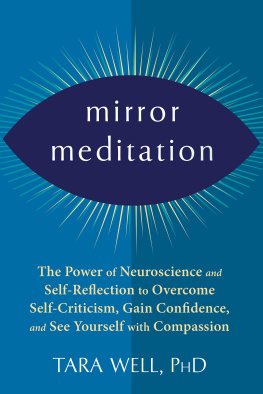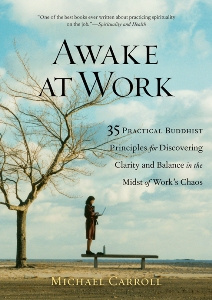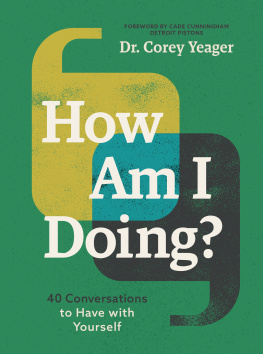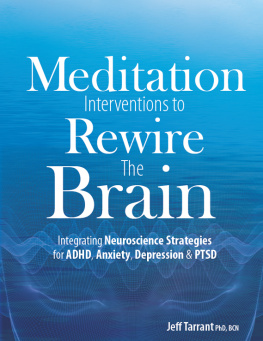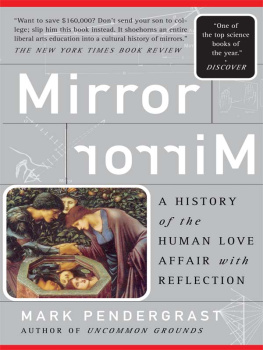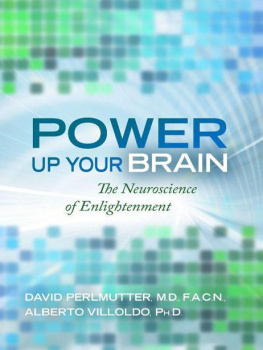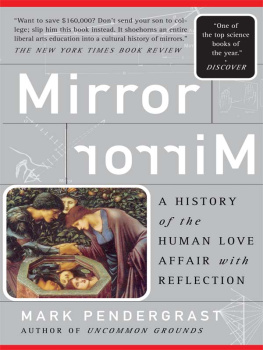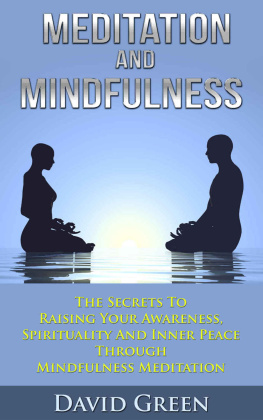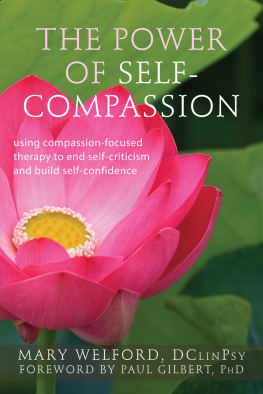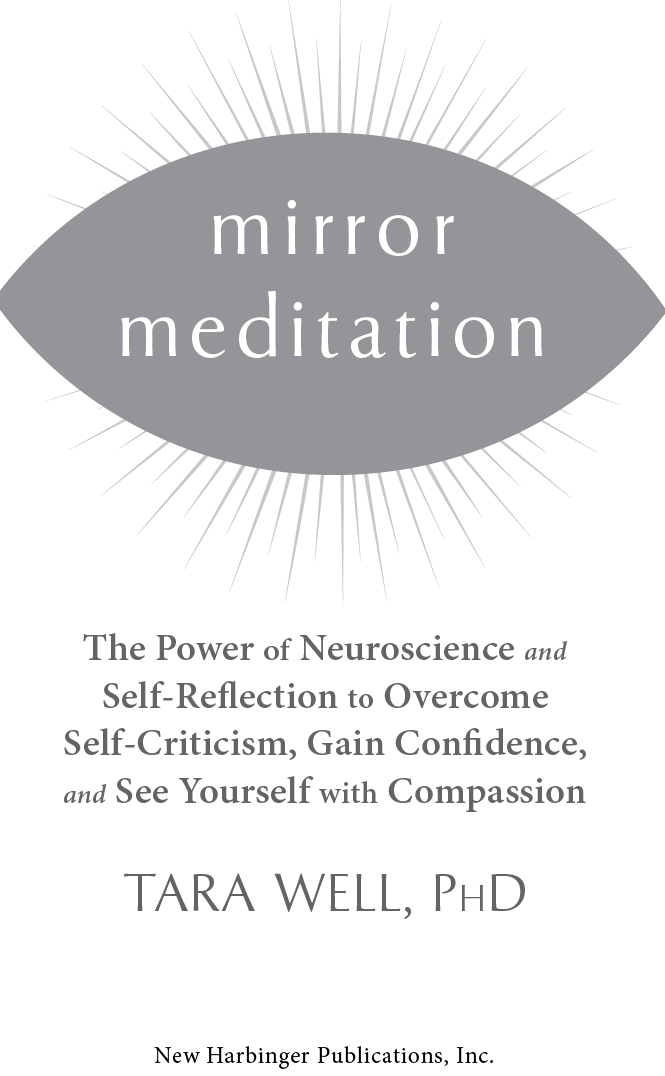Tara Well is an extraordinarily creative psychologist. In Mirror Meditation , she introduces a powerful new approach to self-awareness that encourages people to look at themselves and each other with compassion and clarity. As our world becomes more complex and uncertain, theres an urgent need for this book. Mirror Meditation is a truly unique offering that is sure to change the lives of many readers worldwide and how they literally see themselves.
Scott Barry Kaufman, PhD , host of The Psychology Podcast , and author of nine books, including Transcend
Mirror Meditation is an important contribution to understanding how we see ourselves and the world around us. Tara Wells approach is smartly based on science, yet her true gift is making these lessons accessible, personal, and even fun. This book is for anyone who wants to experience the power of seeing themselves clearly and compassionately.
Tasha Eurich, PhD , organizational psychologist, and New York Times bestselling author of Insight and Bankable Leadership
Mirror Meditation is a game changer! If you ever struggle to believe in yourself, Mirror Meditation will help you reconnect to your worth and move forward to create a richer and more rewarding life.
Margie Warrell, PhD , speaker, and author of Youve Got This
What happens in your mind when you look at yourself in the mirror? Drawing on psychological research and a deep understanding of human selfhood, Tara Well provides new insights into the nature of self-reflection. Her book is full of powerful stories, sage psychological advice, fascinating scientific findings, and provocative insights for living a full and authentic life.
Dan P. McAdams, PhD , Henry Wade Rogers professor of psychology at Northwestern University, and author of The Stories We Live By
What a gem of a book this is! Tara Wells Mirror Mediation is creative, fresh, and has the potential to bring great relief to many. The book is beautifully written, yet brings together research from social psychology to neuroscience. With clear exercises and tips for readers, it is a unique addition to the field of mindfulness, meditation, and psychology at large.
Robert T. Muller, PhD , professor of clinical psychology, and author of Trauma and the Struggle to Open Up
Mirror Meditation is a very valuable resource, providing tools that are practical, easy to implement, and based on current research findings in brain science, health, and personality psychology. Its focus on increasing self-awareness, reducing self-objectification, and increasing mindfulness are timely and important in the era of Zoom meetings and seeing ones own face on screen all day. Tara Well is clearly an expert in her field, providing tools and research-based advice that is fresh, workable, and helps us relate to ourselves with greater self-compassion.
Melanie Greenberg, PhD , clinical psychologist, and author of The Stress-Proof Brain
Publishers Note
The content in this book is for informational purposes only and is not intended to be a substitute for professional advice, diagnosis, or treatment by a licensed mental health care provider. Seek the advice of a professional mental health provider with any questions you may have about your mental health.
This is a work of nonfiction. Nonetheless, some of the names and details of individuals and scenarios have been changed to disguise their identities. Therefore, any resulting resemblance to persons living or dead is entirely coincidental and unintentional.
NEW HARBINGER PUBLICATIONS is a registered trademark of New Harbinger Publications, Inc.
New Harbinger Publications is an employee-owned company.
Distributed in Canada by Raincoast Books
Copyright 2022 by Tara Well
New Harbinger Publications, Inc.
5674 Shattuck Avenue
Oakland, CA 94609
www.newharbinger.com
Cover design by Sara Christian; Acquired by Jennye Garibaldi; Edited by Gretel Hakanson
All Rights Reserved
Library of Congress Cataloging-in-Publication Data on file
Contents
In memory of Richard
Introduction:
Explore Your Mirror Wisdom
Did you look in the mirror today?
Do you try to avoid looking at yourself?
Or maybe wish you could stop looking?
Mirrors can evoke some strong feelings in us. But they can also be incredibly useful in ways you might not have imagined. In this book, youll find that the mirror is one of the most essential tools you have to deal with lifes challenges. Because mirrors allow us to come face-to-face with ourselves. Being reflected is one of the most important and powerful experiences we can have as humans.
As adults, glancing in the mirror can become second nature. We use mirrors for personal grooming and to check how we look before we go out in public. But what if you took a different approach to how you see yourself in the mirror? Remember when you were a child? What was it like to see yourself in the mirror?
When I was a little girl, I used to look at my reflection in the side of the shiny chrome toaster on the table for as long as my parents would let me, clowning around, making faces, and imitating the adults around me. When I saw myself, I felt a sense of comfort and delight. But like most of us, as I grew older, societys expectations of me changed, and I started to use the mirror to scrutinize my appearance and compare it to the actors on TV and models in fashion magazines.
What I saw in the mirror never seemed to measure up.
Then one day, I caught a glimpse of my face in the mirror, and I was shocked by how sad and distressed I looked. I hadnt realized I felt that way. Id been walking around thinking I felt fine. In that moment of realization, I knew that, by trying to create a perfect image for others to see, Id lost touch with how I felt inside. After that, I began to take time to look at my reflection in the mirror, not to focus on my appearance, but to simply acknowledge how I felt. Over time, it became a way to look beyond my appearance and see deeper into my own eyes with compassion. It became a meditation.
The mirror was so helpful to me, and as a research scientist, I wanted to understand why. So I began conducting mirror-gazing experiments in which research participants meditated on their own reflection. At first, they seemed awkward and self-conscious, their faces were often tense, and their eyes were harsh and critical. I guided them to see beyond their surface appearance and take a deeper look. In the process, something magical happened. Often by the end of the session, their faces had softened, and a glint of delight shone in their eyes. And, they reported some amazing insights. It was fascinating how a simple mirror could be the catalyst for so many different kinds of realizations. I worked with people and watched with wonder how meditating with a mirror changed them. They reported some amazing revelations. Three main changes stood out.
First, they became aware of just how much they criticized themselves. Whether it was their appearance or something else that they habitually found unacceptable, the mirror brought it to light. And the mirror revealed just how much their criticisms were affecting them because they could see it on their face! Then they had a choice, and a practice, to treat themselves with more acceptance and compassion.
Second, the mirror reflected their facial expressions with exquisite accuracyso they were much more aware of how they were feeling moment to momentwhich at first was a bit shocking for many. Some became more aware of emotions they typically avoided, like fear, anger, or disgust. Their capacity to accept and manage a broader range of emotions grew over time.

